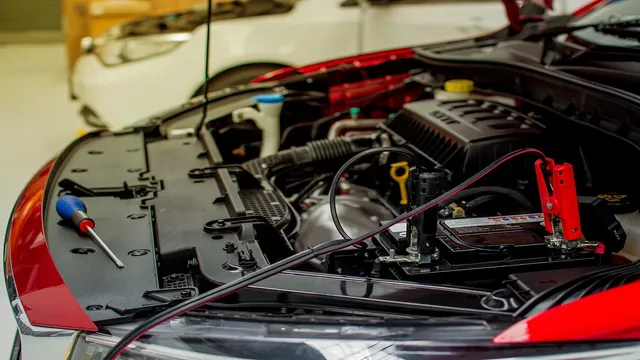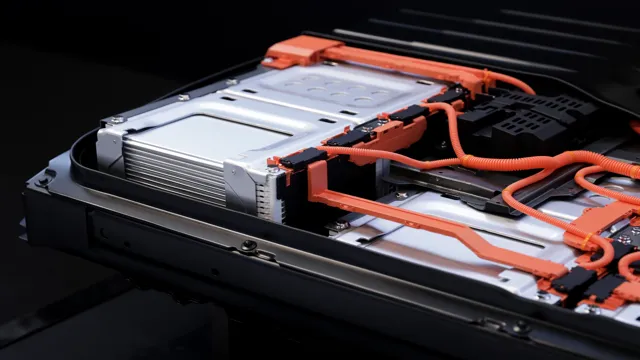Unlocking the Mystery: How Long Do Electric Car Batteries Really Last?
Electric car batteries are the future of transportation, providing a sustainable and environmentally friendly solution to fossil fuels. As we move towards a more eco-conscious society, it’s important to understand the lifespan of electric car batteries and how they impact our daily lives. Unlike traditional cars, which require frequent oil changes and repairs, electric car batteries have a longer lifespan.
But how long can we expect them to last? And what factors affect their lifespan? In this blog, we’ll explore the ins and outs of electric car battery lifespan, including what affects it, how to extend it and what happens when it’s time to replace the battery. So buckle up and get ready to dive into the world of electric car batteries!
Factors affecting battery life
Electric car batteries have come a long way since their inception, but one of the biggest considerations for anyone looking to purchase an EV is how long the battery will last. The lifespan of an electric car battery depends on several factors, including the type of battery, the temperature in which it is used, and the frequency of charging. Lithium-ion batteries used in most electric cars typically last between 8-10 years or roughly 100,000 miles.
However, extreme temperatures, frequent fast-charging, and high mileage can all cause premature aging of the battery, ultimately reducing its lifespan. It’s important to note that batteries degrade slowly and progressively over time, rather than suddenly failing altogether. While the lifespan of an electric car battery may vary, it’s important to factor in the cost of replacing the battery when considering the overall cost of owning an EV.
Temperature
Temperature Temperature is one of the most critical factors affecting battery life. Extreme temperatures can significantly impact battery performance and life expectancy. High temperatures can cause battery fluids to evaporate, which leads to a decrease in battery capacity.
On the other hand, extremely low temperatures can slow the chemical reactions inside the battery, resulting in a decrease in voltage output. It’s recommended to store batteries at room temperature, which is around 20-25°C (68-77°F). If a battery is used in an area with extreme temperatures, it’s best to monitor the battery’s performance closely and replace it as needed.
In addition, it’s crucial to keep batteries away from heat sources, such as direct sunlight, radiators, or hot surfaces. Overall, managing temperature is key to optimizing battery life and ensuring that it performs at its best.
Driving habits
When it comes to the battery life of your vehicle, there are several factors that can affect it. One of the most significant factors is your driving habits. For instance, if you’re someone who frequently drives short distances or primarily drives in stop-and-go traffic, your battery may not have sufficient time to recharge fully.
This can result in the battery being weakened and not holding a capacity charge. Additionally, if you leave your car parked for an extended period, the battery can go into power-saving mode, leading to a lower charge. Conversely, if you regularly take longer trips, the battery will have a better chance to recharge fully, leading to improved battery life.
It’s also essential to ensure that all of your vehicle’s electrical components, such as headlights, taillights, and air conditioning, are turned off when you’re not using them. These small actions can make all the difference in prolonging your battery’s life. So, it’s essential to pay attention to your driving habits and make changes where necessary to ensure your vehicle’s battery lasts as long as possible.
Average battery life of electric cars
One of the biggest concerns for any electric car owner is the battery life of their vehicle. So, how long do electric car batteries last on average? Well, it depends on a variety of factors such as usage patterns, temperature conditions, and battery technology. Typically, the average lifespan of an electric car battery is around 8-10 years or approximately 100,000 miles.
However, with advancements in battery technology and improved charging infrastructure, this number is expected to increase in the near future. It’s worth noting that manufacturers offer warranties on electric car batteries which can range from 8 to 10 years or 100,000 to 150,000 miles, whichever comes first. While electric car batteries do degrade over time, they can still hold up to 80% of their original capacity even after several years of use.
So, owners can rest assured that their electric car will provide reliable performance for years to come.
Tesla Model S
When it comes to electric cars, one of the biggest concerns for potential buyers is the battery life. Fortunately, the Tesla Model S, an all-electric luxury sedan, has an average battery life of about 300,000 miles. This is significantly longer than the battery life of conventional gas-powered cars, which typically last around 200,000 miles.
Of course, the lifespan of each battery pack will depend on a variety of factors such as driving habits, environmental conditions, and how well the car is maintained. Tesla takes these factors into account when designing their batteries, using high-quality materials that can withstand extreme temperatures and heavy use. Additionally, Tesla offers an eight-year, unlimited-mileage warranty on Model S batteries, giving drivers peace of mind and confidence in their investment.
So if you’re considering an electric car, the Tesla Model S might just be the way to go, with its long battery life and impressive features.
Nissan Leaf
The Nissan Leaf is one of the most popular electric cars on the market today, known for its sleek design, eco-friendliness, and overall affordability. One important consideration for those interested in driving an electric vehicle is the average battery life. For the Nissan Leaf, the battery life can vary depending on several factors, such as driving habits, weather conditions, and how frequently you charge the car.
On average, the Nissan Leaf’s battery can last anywhere from 8 to 10 years or up to 100,000 miles. Of course, it’s worth noting that this is just an average estimate, and there are many ways to extend the life of your Nissan Leaf’s battery. Regular maintenance, such as keeping the battery clean and making sure it’s charged regularly, can go a long way in helping you get the most out of your electric vehicle.
Whether you’re a first-time electric car owner or a seasoned pro, the Nissan Leaf is a great option for those looking to make the switch to eco-friendly transportation. By choosing the Leaf, you can enjoy a reliable, cost-effective ride with the added benefit of knowing you’re doing your part to protect the environment.
Chevy Bolt
The Chevy Bolt is a popular electric car known for its impressive range and efficiency. One common concern among electric car owners, however, is the battery life. On average, the battery life of electric cars can vary greatly depending on factors such as the make and model of the car, driving habits, and weather conditions.
Some electric cars may need a battery replacement after 100,000 miles, while others can last up to 200,000 miles or more. The Chevy Bolt, for example, is estimated to have an average battery life of around 150,000 miles, which is above average compared to other electric cars on the market. While the initial cost of the Chevy Bolt may be higher than that of a traditional gas-powered car, the long-term savings on gas and maintenance costs, coupled with a longer battery life, can make it a wise investment for environmentally-conscious drivers looking to save money in the long run.
Maintenance tips for extending battery life
Electric car batteries are an essential component of any electric vehicle, and knowing how long do they last is crucial for any owner. On average, most electric car batteries have a life expectancy of eight to ten years, but with proper maintenance, this lifespan can be extended. One of the most important steps an owner can take to prolong their battery life is to avoid exposing it to extreme temperatures.
High temperatures can cause the battery to degrade quickly, which can significantly impact its lifespan. Another tip is to avoid letting the battery discharge fully before recharging it. Doing so reduces stress on the battery, which can help it last longer.
Additionally, ensuring that the battery is charged regularly and not allowed to sit for long periods without use can also help prolong its life. By keeping these tips in mind, you can help extend the lifespan of your electric car battery, which can save you money and stress in the long run.
Regular charging
One of the best ways to maintain your battery’s longevity is to charge your device regularly. Ideally, you should try to charge your phone before it reaches the critical battery level. This will help prevent over-discharging, which can gradually reduce the battery’s capacity over time.
Additionally, it’s best to avoid charging your phone overnight since this can lead to overcharging. Instead, try to charge your phone during the day when you can keep an eye on it. By regularly charging your phone when it needs it, you can help to ensure that it stays in good condition and lasts for as long as possible.
So, whether you’re at home or on the go, remember to keep your device topped up and ready to go whenever you need it.
Avoiding full discharge
When it comes to extending the lifespan of your battery, avoiding a full discharge is key. Many people don’t realize that completely draining your battery on a regular basis can have a significant negative impact on its overall health. One way to prevent full discharge is to pay attention to your battery’s power levels and charge it before it gets too low.
Additionally, it’s important to keep your battery cool, as high temperatures can cause it to degrade faster. Regularly cleaning your device and keeping it in a well-ventilated area can help with this. By taking these simple maintenance steps, you can help ensure that your battery lasts as long as possible.
When to replace your electric car battery
Electric car batteries are designed to last for many years. However, it’s important to know when it’s time to replace them to avoid any potential issues or safety concerns. The lifespan of an electric car battery largely depends on factors like driving habits, climate conditions, and overall maintenance.
On average, electric car batteries are expected to last between 8-10 years or approximately 100,000-150,000 miles. Several signs indicate that it’s time to replace your electric car battery, such as reduced driving range, slower charging times, and a decrease in overall performance. The good news is that replacing an electric car battery is becoming more affordable and accessible as battery technology continues to improve.
Regularly scheduling maintenance and closely monitoring your electric car battery’s performance can extend its lifespan and prevent any unexpected issues down the road.
Conclusion
In conclusion, the lifespan of electric car batteries depends on various factors such as the type of battery, environmental conditions, and maintenance. While some batteries may last for over a decade, others may need replacements in just a few years. However, with the advancements in technology and the increasing demand for sustainable transportation, the future of electric car batteries looks bright.
So buckle up, charge up, and enjoy the ride towards a greener future!”
FAQs
How long do electric car batteries typically last?
The lifespan of electric car batteries varies depending on factors such as usage, temperature, and type of battery. However, most electric car batteries can last anywhere from 8 to 10 years before needing to be replaced.
Can the lifespan of electric car batteries be extended?
Yes, there are several ways to extend the lifespan of electric car batteries, such as avoiding frequent fast charging, keeping the battery cool, and maintaining a consistent charge level.
How much does it cost to replace an electric car battery?
The cost of replacing an electric car battery varies depending on the make and model of the vehicle, as well as the type and size of the battery. However, on average, the cost can range from $5,000 to $15,000.
Can electric car batteries be recycled?
Yes, electric car batteries can be recycled to recover valuable materials such as lithium, cobalt, and nickel. This not only reduces environmental waste but also helps to reduce the cost of producing new batteries.





